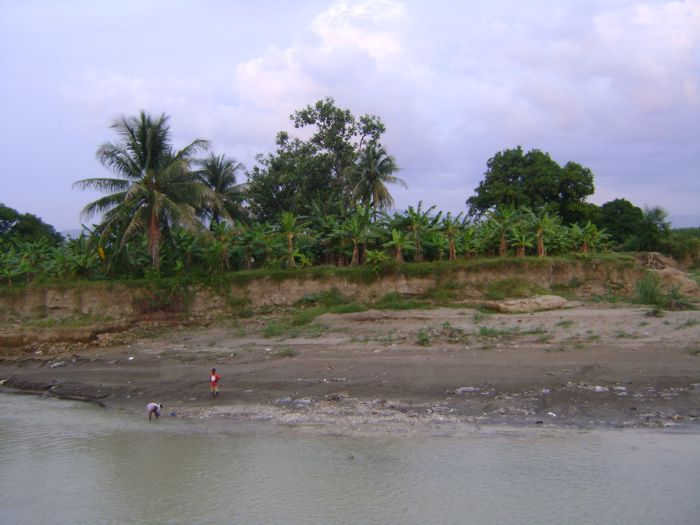| Kaz | Enfo | Ayiti | Litérati | KAPES | Kont | Fowòm | Lyannaj | Pwèm | Plan |
| Accueil | Actualité | Haïti | Bibliographie | CAPES | Contes | Forum | Liens | Poèmes | Sommaire |
Istwa L’Asile (Lazil), yon komin an Ayiti The history of L’Asile (Lazil), a commune in Haiti 3 mas 2018 : March 3, 2018
Photo: Dr Josee Védrine-Pauleus |
N ap pran opòtinite sa a pou n salye tout konpatriyòt ki fèt (nan komin) Lazil, tout zanmi ki konekte ak Lazil, tout jenerasyon ki gen rasin yo Lazil. Ak opòtinite wot teknoloji a ban nou jounen jodiya, nou pa ka plenyen si nou ta renmen fè yon bagay nan kapasite nou pou komin kote nou soti Ayiti a. Wi, nou kapab! Nou kapab, osilontan nou gen volonte. Lajan pa (premye) pwoblèm nan, men se pito volonte. |
|
We are taking this opportunity to greet all countrymen who were born in (the commune of) Lazil, all friends who are connected with Lazil, all generations who have their roots in Lazil. With the opportunity that the high technology gives us today, we can’t complain if we would like to do something in your capacity for your (native) commune in Haiti. Yes, we can! We can, as long we have the will. Money is not the (first) problem, but it’s rather will. |
N ap salye, e ankouraje tout òganizasyon kominotè ki epapiye nan tout kote nan dyaspora a, k ap fè yon travay kèlkonk pou ede zòn yo soti Ayiti a. Nou bat bravo pou sa! Se bèl bagay lè ou ka òganize w ak gwoup moun kote w soti, pou wè sa ou ka fè ansanm pou ede amelyore sitiyasyon zòn sa a. |
We are greeting and encouraging all community organizations spreading out through the diaspora, doing some works somehow to help their area in Haiti. We applaud that! It’s wonderful when you can organize yourself with group of people where you are from, to see what you can do together to help improving the situation of that area. |
|
Etan natif natal Lazil, nou pa leve jwenn oken liv sou istwa Lazil. Menm jan ak youn nan piyonye istwa d Ayiti, an palan de Thomas Madiou, ki pa t ka jwenn yon liv istwa d Ayiti pou l li (lè l te mande papa l sa), misye di enben li pral ekri yon istwa d Ayiti. De mèm, nou menm Azilwa ki pa gen yon liv sou istwa Lazil, enben nou pral ekri youn ansanm. |
Being a native of Lazil, we didn’t grow up finding any book on the history of Lazil. Same as one of the pioneers of Haiti’s history, in reference to Thomas Madiou, who could not find a book on the history of Haiti to read (when he asked his dad for one), he (Thomas) then said he is going to write a history of Haiti. The same way, we, native of Lazil who don’t have a book on the history of Lazil, then we are going to write one together. |
|
Men, kijan nou kapab reyalize yon tèl pwojwè? Repons lan senp: atravè patisipasyon tout moun ki volontè pou kontribye atravè entèvyou yo ka ban nou, istwa seksyon riral yo kote yo soti, sa paran e gran paran yo rakonte, e tout sa yo ta konnen. Sètadi, globalman, se «istwa oral» yo pral rakonte. Etan editè pwofesyonèl, nou pa enterese nan kote prive pesonn; n ap respekte sa tou. E menm nan entèvyou yo, n ap koupe pati sansib ki ta prive, avan nou pwodui transkrip final la ki pral an liy (sou entènèt) dekwa tout moun ka aksede l gratis ti cheri, kòm dokimantasyon. |
But, how can we achieve such a project? The answer is simple: it’s through each one’s participation who volunteers to contribute through Interviews they can give us, the history of the rural sections where they are from, what their parents and grandparents told them, and all that they know. That is, globally, “oral history” they are going to tell. As professional editors, we are not interested in the private side of anyone; we are respecting that also. And even in the interviews, we will cut off sensitive parts that would considered to be private, before producing the final transcript that will one, so that everyone can access it free of charge, as documentation. |
|
| Nou pa pral pibliye oken foto san pèmisyon mèt foto a ki gen dwa d otè l. Ap gen yon Galri (achiv foto). Wi, n ap pibliye foto ladan, e n ap mande pou ekri yon ti nòt ki dekri sa k nan foto a, e chak ap gen yon nimewo. Se la n ap rete; n ap mande w pataje nòt sa a ak maksimòm moun Lazil posib pou pote kontribisyon yo nan pwojè istwa komin yo. Yo kapab kontakte nou nan creoleEditions@gmail.com epi sa ki sou lis WhatsApp nou deja kapab kominike ak nou dirèk. Mèsi anpil! Rezo Edike Ayisyen Ayiti, e Ayisyen nan Dyaspora. Ribrik 3 mas, 2018, «Istwa Lazil». | We are not going to publish any picture without permission of the picture’s owner who has the copyright. There will be a Gallery (photo archives). Yes, we will publish pictures in it, and we are asking to write a short note to describe what’s in the picture, and a number will be assigned to each one. We are stopping here; we are asking you to share this note with maximum people from Lazil in order to bring their contribution to the history project of their commune. They can contact us through creoleEditions@gmail.com and those who are in our WhatsApp contact already can communicate directly with us. Thank you very much! Network of Educating Haitians in Haiti, and Haitians in the Diaspora. Caption of March 3, 2018, “the history of Lazil”. |
Koutwazi : Courtesy
E. W. Védrine Creole Project, Inc.
Boston, Massachusetts
![]()

